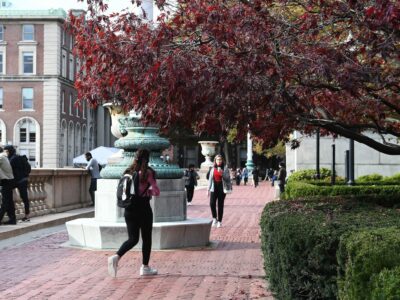
1. Why did you choose to teach at Columbia in the ESP program?
I was attracted to the ESP program by three things that are vital to each other. The first is the broad focus on trying to understand the environment and human impacts upon it. Critical to that focus are the agents of change – both the students who choose the program and are committed to making a difference, and my colleagues inside and outside the program. I like the energy that people devote to exchanging ideas whether in the classroom or at the multitude of special events. One never has any excuse to be bored.
2. What is new in your area of research?
Historians of science think of “new” in a different way than do scientists, but because I study the intersection of science and society, I am always on the lookout for new paradigms of how we interact with our surroundings. I am currently exploring different models of collaboration that shape scientists’ efforts in scientific institutions.
3. What is your favorite part of your job as an instructor?
I love current events, and the environment plays a critical role in all human endeavors, so I like to meld the two in the classroom. Outside of class I really enjoy chatting with students about their professional aspirations, or if they are uncertain about what those are, helping them figure them out. Once I have a sense of what they want, I link them with alums who make it all real for them by describing their jobs and suggesting strategies for the job hunt. They are the best at putting the program in perspective and boosting their confidence. I can’t count how many times former students have emailed me to say, “now I realize why I needed to know (fill in the blank)”.
4. What do you believe is the greatest benefit that the ESP program has to offer its students?
I may be biased as one of the instructors, but I think they finally see all their hard work come together in the spring semester when they do a real-world consulting project for the Workshop. That is the bridge to their future career and it is satisfying to see them overcome hurdles and meet challenges in analyzing a policy problem and suggesting recommendations. Equally important are the friendships they make amongst each other.
5. What advice would you give to your ESP students for when they eventually go on to work in the field as public managers and policymakers?
To be sure to help their future colleagues as they helped each other during the program, and to remember the many different lenses they can use to make sense of the complexity of the environment.
****
Students in the MPA in Environmental Science and Policy program enroll in a year-long, 54-credit program offered at Columbia University’s School of International and Public Affairs, in partnership with the Earth Institute.
Since it began in 2002, the MPA in Environmental Science and Policy program has given students the hands-on experience, and the analytical and decision-making tools to implement effective environmental and sustainable management policies. The program’s 682 graduates have advanced to jobs in domestic and international environmental policy, working in government, private and non-profit sectors. Their work involves issues of sustainability, resource use and global change, in fields focused on air, water, climate, energy efficiency, food, agriculture, transportation and waste management. They work as consultants, advisers, project managers, program directors, policy analysts, teachers, researchers and environmental scientists and engineers.
Visit our website for more information: http://mpaenvironment.ei.columbia.edu/



